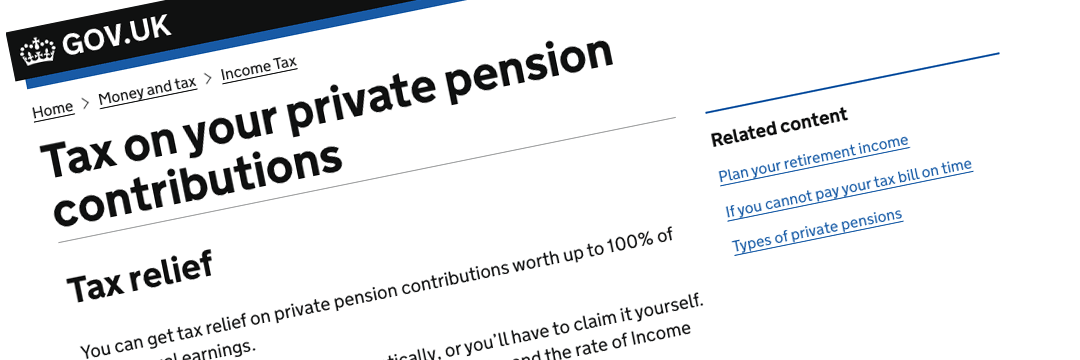Pensions Tax Relief

Everyone who pays into a pension scheme is entitled to pensions tax relief. Depending upon how your pension deductions are arranged, you may be entitled to more pensions tax relief than you are getting. Millions of people in the UK are entitled to additional pensions tax relief that they are not claiming.
There are three different ways that pension contributions can be paid:-
- Pension Deductions are taken from your pay BEFORE tax is deducted.
You only pay tax on your remaining pay after your pension contributions, and therefore, you will not be entitled to any further tax relief. - Pension Deductions are taken from your pay AFTER tax is deducted.
You are paying your pension contributions from money that you have already paid tax on and you may be entitled to further tax relief. - Pension Deductions are paid DIRECTLY from your own bank account.
You are paying your pension contributions from money that you have already paid tax on and you may be entitled to further tax relief.
Pension Deductions taken before tax are always correct and take into account your personal tax allowance and your tax rate. Because you will already have received full pensions tax relief on your contributions, you cannot claim any further tax relief.
When you make pension contributions from your net pay, or directly from your own bank account, you are making payments from your own money that has already been taxed. To compensate you, the government will automatically add 25% onto the sum that you pay. So if you pay £80 per month, your pension provider will invest £100 in your pension plan. The extra £20 comes from the UK government, effectively paying 20% of your total pension contributions.
This is because pension contributions are 100% tax deductible and the 20% contribution is the government’s way of giving you back the income tax you have already paid earning the money that went into your £80 contribution.
The key fact about this automatic arrangement is that the amount the government pay is fixed at 20%. So if you pay tax at anything above 20%, you are not being fully compensated. Also, the flat rate 20% arrangement takes no account of your annual personal allowance (currently £12,750 a year) that you do not have to pay tax on.
In Scotland, there are now four tax bands above 20% and if you have any earnings in any of these three bands you are entitled to claim back the additional tax you have paid above 20%. As follows:-
- 1% up to the amount of any income you have paid 21% tax on
- 22% up to the amount of any income you have paid 42% tax on
- 25% up to the amount of any income you have paid 45% tax on
- 27% up to the amount of any income you have paid 47% tax on
So for every person in Scotland making personal pension contributions and who is paid more than the 21% tax threshold of £25,668 a year, there is tax to be refunded. For higher rate tax payers, the amounts can be substantial.
You can claim for refunds either by writing directly to HMRC or by completing a Self Assessment Tax Return at the end of the tax year. We can help you by contacting HMRC on your behalf, or by assisting with your Self Assessment Tax Return.
HMRC Link:-
https://www.gov.uk/tax-on-your-private-pension/pension-tax-relief
See more articles on our Clients Page
